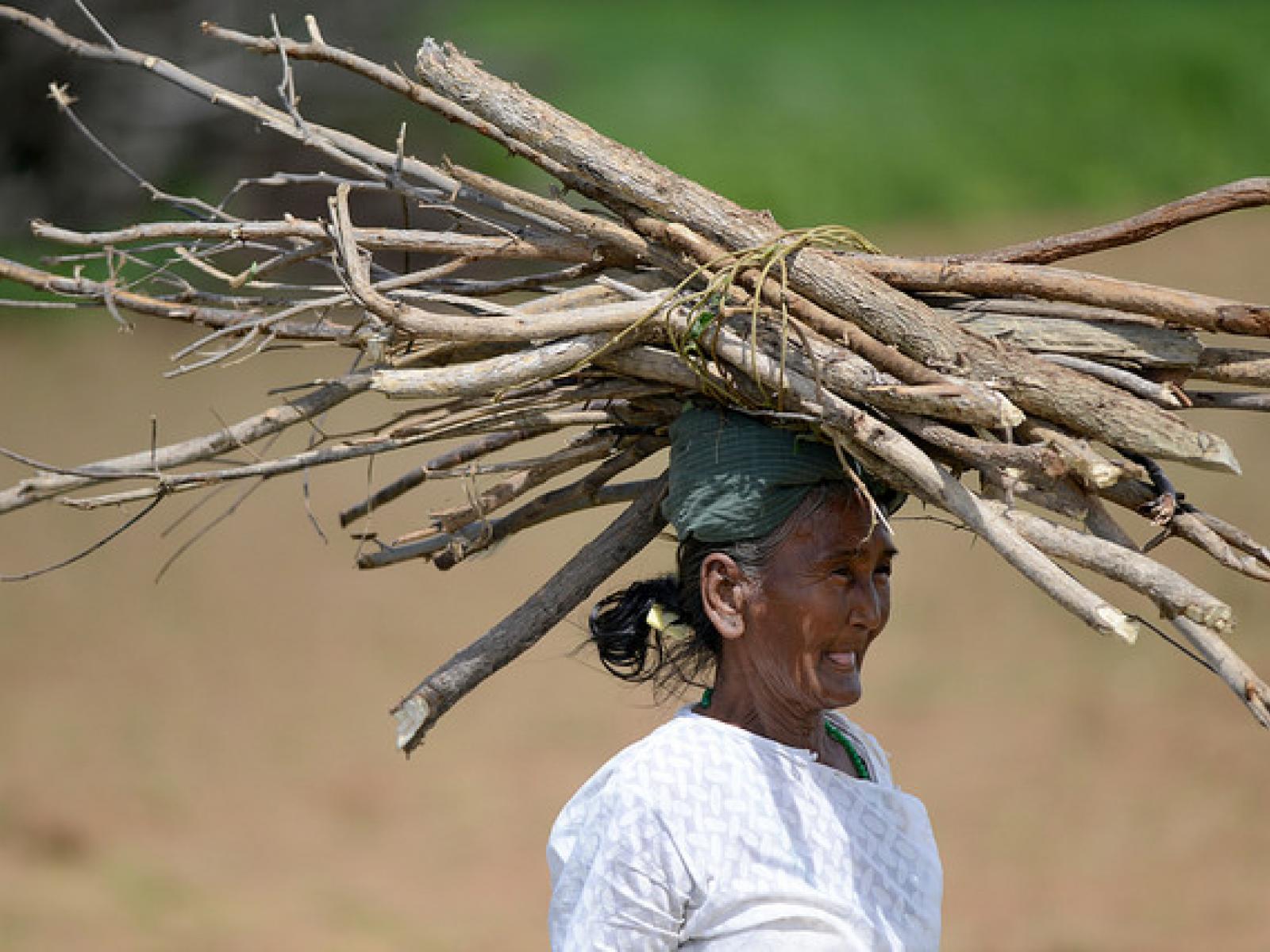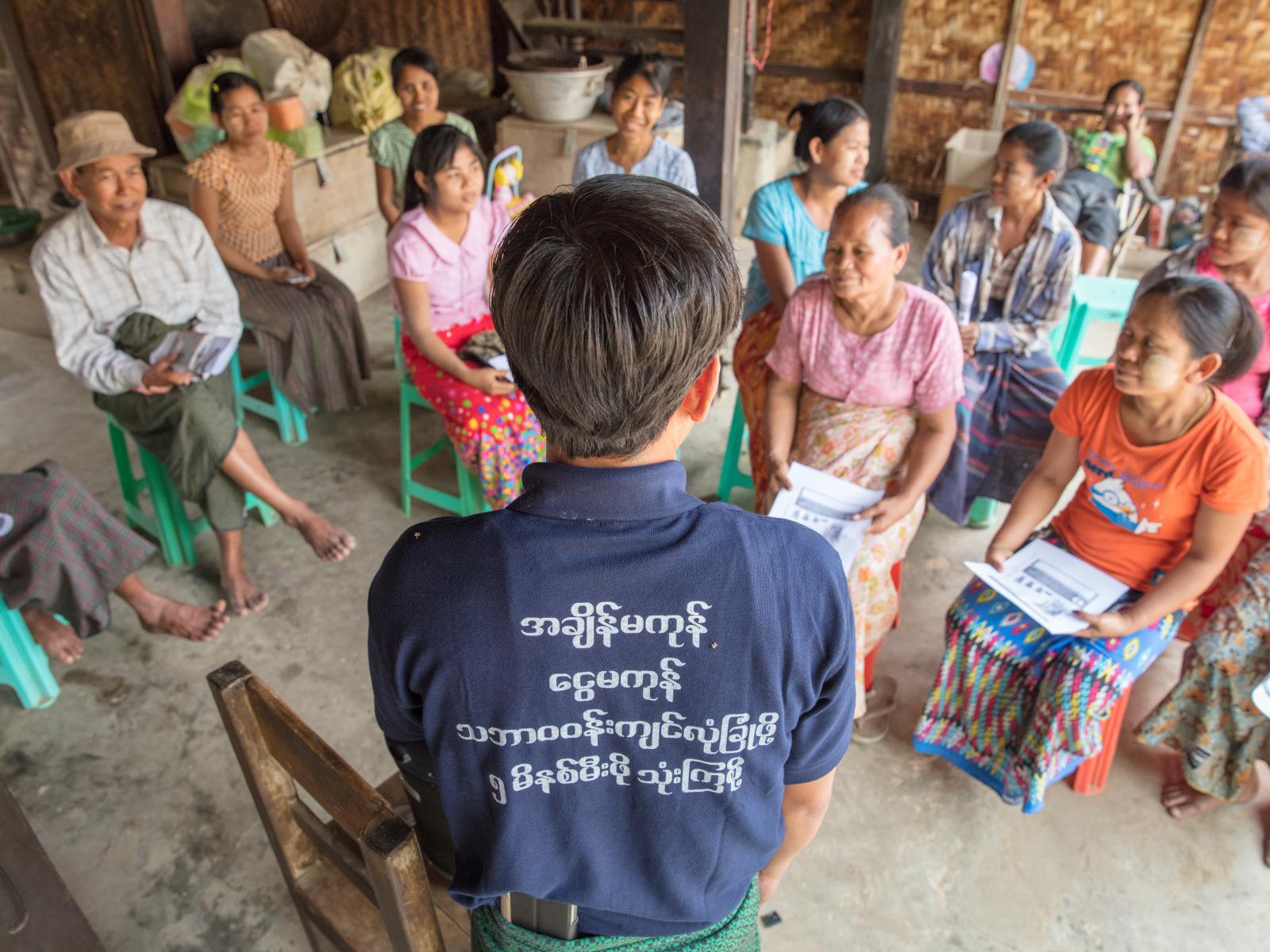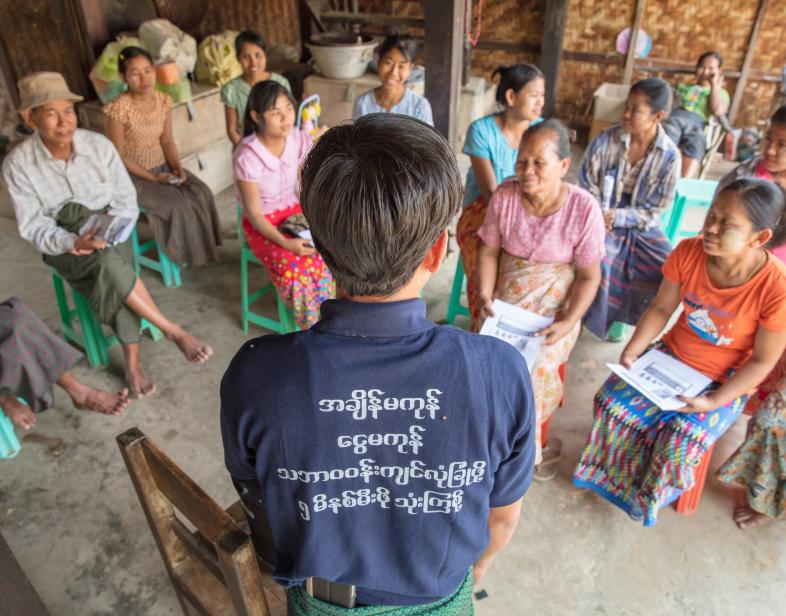An Overview Of Our Solution
About 10 million households in Myanmar rely on biomass for cooking. Cooking with biomass contributes to deforestation and release greenhouse gases. Women and children are affected due to their role collecting firewood and cooking. Since 2014, Mercy Corps Myanmar has worked on the Myanmar Stoves Campaign, a Gold Standard Foundation Project. The stoves, sold by local sales agents, save fuel consumption by up to 66%and harmful emission by80%. To date,710 agents have sold over 27,000 stoves to households mitigating an estimated 189,000 tons of CO2. Through the Climate Change Needs Behavior Change Competition, Mercy Corps will continue to scale the Myanmar Stoves Campaign in Magaway Region.90 new agents will receive training in business skills,behavior change communication and climate change. Trained agents will hold sales session in 230villages to sell 3,500 stoves.
- Population Impacted: 17,500
- Continent: Asia
Context Analysis
In Myanmar,26%of people live below the poverty line, with poverty rates twice as high in rural areas to 70%of the population. Myanmar is ranked as among the most vulnerable countries to climate change in the world . In 2015, Global Forest Resource Assessment reported that Myanmar had the 3rd highest deforestation rate in the world. Poverty, deforestation, climate change vulnerability are interlinked threats that imperil Myanmar's future prosperity.
84%of rural homes rely on firewood for daily cooking, and an average household consumption of 4 tons of wood per year. Cooking with biomass contributes to deforestation and releases greenhouse gases. The proposed project site, suffers from climate change related extreme weather events: floods and droughts.
In rural families, women and children are disadvantaged due to their duty for gathering firewood and cooking. Gathering firewood is time consuming. Cooking releases toxic smoke and emissions that give adverse impacts on human health.
Describe the technical solution you wanted the target audience to adopt
Introducing fuel-efficient stoves (FES) reduces fuel consumption by up to 66% compared to a traditional, three-stone fire. Moreover, FES reduce carbon dioxide emission by 50% and particulate matter emission 80%. The stoves shorten the time spent on cooking-related activities such as collecting firewood and cooking (average reduction of 92 hours per month for a family), as it takes up to 50% less time to cook than traditional models. This allows family members, particularly women, additional time in their day to carry out other productive activities. For example, households have more time to engage in or tend to farm work and earn more income from better yields. Households not only will reduce household expenditure on fuel, they enable families to utilise the savings for other household essentials such as healthcare, education, and buying nutritious food.
Type of intervention
Describe your behavioral intervention
The primary behaviour change targeted is the purchase and appropriate use of a fuel efficient cookstove that reduces firewood consumption by up to 66% and emissions by 80%. Through awareness campaigns and training, the target audience will recognize the benefits and purchase a cookstove. Local agents from the consumer’s own communities will teach the targeted audience about the hidden and long-term costs of biomass cooking including wasting time, emissions, deforestation, and climate change. Drivers of adoption include:
1. Time/cost benefits – Data-based decision making using time and cost savings gained from ado the new stove.
2. Social incentives – Local agents will serve as role models and organize collective action to address deforestation and climate change
3. Emotional appeal – During sales presentations, local agents will appeal to the difference each person can make towards reduction of local deforestation and global climate change.
The Mercy Corps team trains sales agents in behaviour change communicate and conducts bi-weekly customer/agent follow-up. Training in communication and sales helps sales agents create compelling presentations to consumers interested in cookstoves. Follow-up activities in the village ensures agents and consumers’ adoption of our desired behaviour. It’s also an opportunity to refresh environmental conservation awareness through using our distributed stoves.
As needed, please explain the type of intervention in more detail
Mercy Corps will select 90women and youth agents from the three townships in Magway Region. Then, the team will train agents in business skill and environmental awareness sessions. Behavior change methodologies are integrated into all the training modules. At the end of the training, agents acquire the necessary knowledge and skills to generate sales. After training, the team will support trained agents to conduct sales and environmental awareness campaigns in 230 villages. Agents deliver the training to drive adoption using behavior change communication methods (i.e., benefits, social incentives, and emotional appeals).Communities learn about fuel efficient stove and links with deforestation, greenhouse gas emissions, and climate change.
Describe your implementation
Mercy Corps will implement the intervention activities as follow:
i) Activities: Select 3 townships with high rates of firewood consumption; Select 90 women and youth who have a high potential for entrepreneurship; Conduct environment and business training to selected agents; Support agents to conduct environmental awareness campaign in 230 villages; Support agents to sell 3,500 fuel efficient stoves to the communities
ii) 3,500 households in the Magway Region adopt fuel efficient stoves and stop using open fires. Mercy Corps will conduct monitoring to ensure consumers continue using stoves after purchase.
iii) Mercy Corps has an ongoing MOU with the Department of Forestry. Under this MOU, Mercy Corps has an import tax waiver for FES. Soneva Foundation, founding partner of Myanmar Stoves Campaign, will purchase the stoves on behalf of the project.
iv) The team has extensive experiences in environment, climate change, and cookstove sector. Most of the team member are from the proposed project areas and know the local context already. That makes them to smooth in selecting agents and reaching to the targeted household.
v) Recruitment of qualified women entrepreneurs: In the Dry Zone, it is difficult to find women candidates due to gender and cultural barriers. Our experience has shown that once we are able to recruit the right cadre of women, they perform better as sales agents and sell more than their male counterparts. Mercy Corps will dedicate sufficient time to plan for awareness campaigns and recruitment events for women using targeted gender messaging.
Youth Empowerment: Mercy Corps will develop a set of tools to identify and recruit interested youth who show potential to succeed as entrepreneurs. It is risky to work with youths who often have very low levels of confidence and entrepreneurial experience in Myanmar. Mercy Corps will draw on its global experience to design empowerment packages that combine training and follow-up support for Myanmar youth.
External connections
Soneva Foundation: Founding partner for the Myanmar Stoves Campaign. Soneva Foundation supports Mercy Corps with a small project budget, stove purchases, and technical assistance on carbon monitoring. Carbon credits, certified by The Gold Standard Foundation, subsidize stove purchase by 60%.
Envirofit: Envirofit is a social enterprise that has helped more than five million people access clean cooking products. Mercy Corps uses the Envirofit M-5000 fuel efficient cookstove for the Myanmar Stoves Campaign.
Ministry of Natural Resources and Environmental Conservation (MoNREC): Mercy Corps has an active MOU with the Department of Forestry under MoNREC. Through the MOU, Mercy Corps coordinates and reports all activities. Mercy Corps has also received an import tariff waiver for cookstoves through MoNREC.
Who adopted the desired behaviors and to what degree?
Since 2014, Mercy Corps Myanmar has supported more than 27,000 households to adopt FES for their daily cooking. 710 agents, trained by Mercy Corps, have sold more than 27,000 cookstoves and earned $245,500. In total, the project has saved 189,000 tons of CO2 (4.6 tonnes of CO2/year per stove) and household have saved $500,000 in firewood purchases.
How did you impact natural resource use and greenhouse gas emissions?
Cooking using firewood produces emissions that contribute to outdoor air pollution, in particular greenhouse gases contribute to global climate change. Fuel efficient stoves reduce the amount of firewood needed to cook by up to 66%. Per the project’s Gold Standard certification, each stove reduces CO2e emission by 4.6 tons per year. The reduction in firewood also has an impact on deforestation. Trees capture the CO2 from the atmosphere creating carbon sinks, protect soil erosion from valuable land. The cumulative effect of our intervention is the contribution towards reducing greenhouse gas emissions and pressure on increasingly scare natural resources. In promoting and supporting this action our intervention will mitigate greenhouse gas emissions and enhance Myanmar’s resilience to climate change. Key indicators for measuring successes are tons of firewood saved (measured through baseline and endline surveys) and tons of CO2 emission reduced(calculated from fuel consumption reduction.
What were some of the resulting co-benefits?
Our intervention will improve access to clean, reliable and affordable sources of energy, reduce the physical and financial burden of energy acquisition as well as drive economic activity and employment opportunities for a network of (90) sales agents. Women entrepreneurs will develop new skills through training on business and environmental conservation skill, as they begin to earn money. These factors help to increase their social standing within their communities.
Our technical solution, a fuel-efficient stove, will also help to reduce indoor and outdoor air pollution which in turn will improve the health of families in rural and peri-urban Myanmar. This will have a particularly positive impact on the health of women and children who spend many hours indoors and around the cooking fire. The stoves also cook food more quickly than traditional models, allowing families to spend more time on other activities such as education, livelihoods activities, or leisure.
Sustainability
Sustainability is at the core of the project. By using market-based incentives, rather than handouts, the project will support the development of a market system of entrepreneurs and retailers. Smart subsidies, through carbon credits, are used to increase affordability to consumers and strengthen the distribution network.
Portions of Mercy Corps’ existing model are financed through consumers’ purchase of stoves. 40% of stove cost is paid by the consumers with 60% cover by a carbon subsidy. Some project costs, however, including part of Mercy Corps’ staff time, training cost and government engagement are currently not fully covered by stove sales and remain donor subsidized.
Return on investment
Mercy Corps requests $25,000 for the proposed activities. Donor funding is combined with project revenue for maximum effect. Revenue for the project is derived through a combination of stoves sales and carbon revenue from the sale of voluntary market carbon credits, certified by the Gold Standard Foundation. Following training, agents sell stoves to consumers and earn income. Incremental stove sales are driven by agency rather than Mercy Corps.
A $25,000 investment will achieve the following return:
• Mitigation of 25,000 tons of CO2, measured to Gold Standard Foundation standards
• Income increase of $7,000 for 90 sales agents
• Estimated co-investment of $40,000 from local communities (stove purchases) and $70,000 from carbon sales
How could we successfully replicate this solution elsewhere?
The current project design is based on a combination of economic benefit (reduction of time collection and money purchasing firewood), social incentives (agent leadership), and emotional appears (climate change and its impacts). It introduces the fuel efficient cookstove, a technical solution, as a practical and relevant solution. The project can be replicated in any places where facing firewood scarcity and limited job opportunities.
Globally, cookstoves are a relevant product for the more than 2.5 billion people who cook using biomass. While relatively new to Myanmar, the cookstove market is vibrant in several other countries including Cambodia and Bangladesh. Mercy Corps’ has used our global experience with cookstoves to develop a unique project for the Myanmar context. Our partnership with the Myanmar Government and Soneva Foundation plus our close relationship with local communities has helped create an innovative initiate with significant scale and blended financing.


